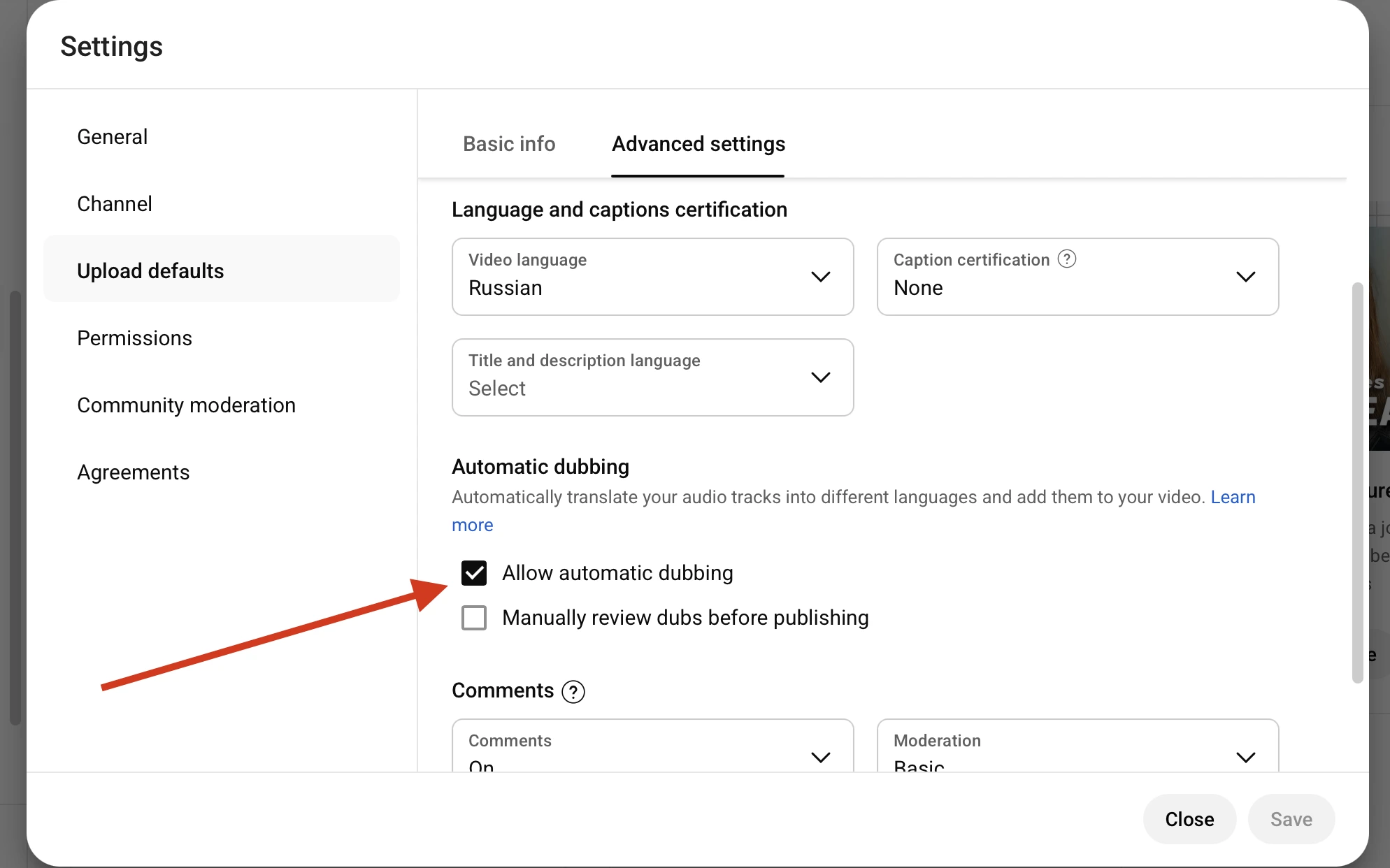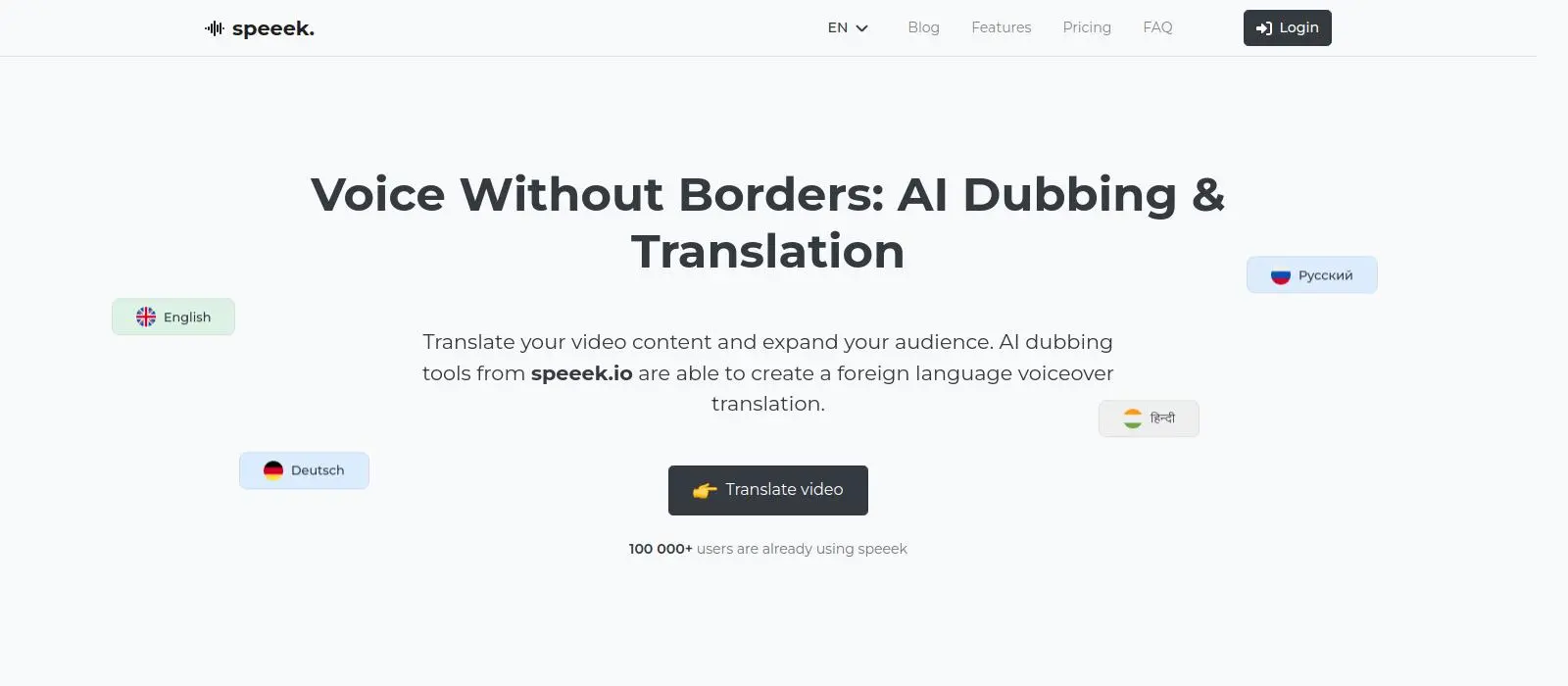In June 2025, Google announced the launch of automatic dubbing for 80 million YouTube creators worldwide. The promise was bold: AI-powered video translation into 30+ languages at zero cost. Reality proved harsher—instead of excitement, creators faced massive viewer backlash. Robotic voices, distorted audio, and complete lack of emotion turned innovation into a headache.

In this article, we'll break down honestly why the feature sparked such criticism, compare it with professional alternatives, and show when YouTube auto-dubbing can actually be useful.
What is YouTube Auto-Dubbing and How Does It Work
YouTube auto-dubbing is Google's AI system that automatically translates and voices your videos into dozens of languages. The technology uses Google Gemini AI for translation and voice synthesis, promising to preserve tone and intonation from the original.
Key Facts:
- 📅 Launched September 2024, mass expansion June 2025
- 🌍 Supports 30+ languages (Russian added November 2025)
- 🆓 Free for YouTube Partner Program members
- ⚙️ Enabled by default (opt-out, not opt-in)
How the process works: The system analyzes the source language, translates text via Google Translate with context awareness, generates an AI voice, and publishes the dubbed version as a separate audio track. Viewers from different countries automatically get the version in their language.
📊 YouTube Statistics: Despite the issues, dubbed versions collect 25%+ of watch time. Jamie Oliver's channel tripled views after implementing multi-language audio.
5 Critical Problems with YouTube Auto-Dubbing
1. 🤖 Robotic, Emotionless Voices
The main user complaint—complete absence of emotion. Google openly acknowledges in official documentation: "Auto-dubbing does NOT convey the tone and emotions of the original audio".
Real User Reviews:
- "The dubbed voice is lifeless, sounds like simultaneous interpretation at a UN session" — Heise Online
- "I watch ASMR videos, and when auto-dubbing kicks in, it kills the entire purpose of the content. Robotic voices drown out the music" — Reddit user
- "The voice sounds like it's coming from a tin can" — How-To Geek
2. 🎭 Voice Timbre and Gender Mismatch
The system can replace male voices with female ones and vice versa, creating cognitive dissonance:
Documented Case: Kings and Generals channel (2.15M subscribers)—historical content about wars with a male original voice. Portuguese viewers complain about a "very robotic, female (high-pitched)" voice in the dub.
If your audience watches videos for your personality and charisma—auto-dubbing will completely destroy that connection. Viewers from other countries will hear a completely different person.
3. 🔊 Distorted Background Audio
YouTube extracts background audio for dubbing, but the result is often unbearable. Professional studio BeMultilingual notes: "Background sound becomes heavily distorted in most cases".
How-To Geek adds: "Any sounds other than dialogue disappear. Dubbed videos sound hollow".
4. ⏱️ No Lip Synchronization
Lip movements DON'T match the dubbed speech. Lip-sync technology has been announced by Google but still hasn't been implemented. For viewers, this creates the effect of an "old Chinese film" with mismatched dubbing.
5. 📱 Issues on Smart TV and Mobile
The most painful point for multilingual users:
- Feature automatically activates for every video
- Global disable unavailable—must manually switch each time
- On Smart TV, this requires 6-8 clicks through an awkward interface
- With YouTube Premium, downloaded videos save only the AI dub
Mass User Reaction:
"I HATE IT. Let me turn this shit off by default"—typical Reddit comment with hundreds of upvotes. YouTube Community Forum is flooded with daily complaints: "PLEASE WHERE IS THE OPTION TO TURN IT COMPLETELY OFF!!!"
How to Disable YouTube Auto-Dubbing: Instructions
For Content Creators (Channel Disable)
Global disable for all new videos:
- Open YouTube Studio
- Click ⚙️ Settings → Upload defaults
- Go to Advanced settings
- Uncheck ❌ "Allow automatic dubbing"
- Click Save
Managing dubs on existing videos:
- YouTube Studio → Content
- Select the video → Languages
- In the Audio column, click ⋮ → choose action:
- Unpublish — temporarily hide
- Delete — remove permanently
For Viewers (Switching Audio Track)
⚠️ Important: YouTube does NOT provide a global disable option for viewers. You must manually switch for each video.
On Desktop:
- Open video → click ⚙️ Settings
- Select "Audio track"
- Choose "Original" or desired language
On Mobile (iOS/Android):
- Play video → tap ⚙️
- Tap "Audio Track"
- Select original audio track
YouTube remembers your choice for future videos from this channel.
Best Alternatives to YouTube Auto-Dubbing
If YouTube auto-dubbing quality doesn't satisfy you, professional solutions with result control exist:
🌐 Speeek — Optimal Solution for Global Creators

Why Speeek Beats YouTube Auto-Dubbing
See the difference between original video, YouTube's automatic translation, and Speeek:
Original Video
YouTube Dub (ES)
Speeek Dub (LipSync with Voice-Clone) (ES)
Comparison: YouTube Auto-Dubbing vs Speeek
| Criteria | YouTube Auto-Dubbing | Speeek |
|---|---|---|
| 💰 Cost & Accessibility | ||
| Price | Free | $9/month (10 min of video) |
| Requirements | YouTube Partner Program (1000+ subscribers) |
Available to Everyone No channel requirements |
| Global Availability | Available | Full access worldwide |
| Payment Methods | Not required | Credit Cards, PayPal, Crypto All major payment methods |
| Free Tier | Unlimited | 5 min/month, no watermark |
| 🎤 Voice Quality | ||
| Voice Type | Robotic generic Emotionless AI |
Premium AI voices + cloning Preserves timbre & emotions |
| Original Matching | May replace male with female Timbre mismatch |
Clones your voice Precise timbre preservation |
| Emotion Transfer | Not transferred Officially confirmed by Google |
Preserves intonation Emotional coloring |
| Background Audio Quality | Distorted/absent "Unbearable" per reviews |
Clean preservation Voice/background separation |
| Lip-sync | Absent Announced, not implemented |
Included (Pro/Business) Precise synchronization |
| ⚡ Functionality & Control | ||
| Pre-publish Control | Limited Preview option only |
Full control Translation editing |
| Text Editing | Impossible | AI transcript editor Manual correction |
| Multi-speaker | One voice for all No speaker detection |
Up to 5 speakers Unique voice for each |
| Use Beyond YouTube | YouTube only | Any platform TikTok, Instagram, Telegram |
| Watermark | None | None (even on Free) |
| 🔧 Technical Parameters | ||
| Language Support | 30+ languages | 20+ languages Including English, Spanish, French |
| Processing Speed | Several hours Depends on system load |
5-10 minutes For 10-minute video |
| Export Quality | Original video quality Audio track only |
720p-1080p+ Up to 4K depending on plan |
| SRT Subtitles | Not generated | Auto-generation + export |
| 🎯 User Experience | ||
| Global Disable | Possible Via YouTube Studio |
Not applicable You control each video |
| Viewer Issues | Auto-activation Mass complaints on forums |
You choose publication language No forced AI voiceover |
| Interface Language | Multiple languages | Multiple languages |
YouTube auto-dubbing is a good tool for market testing with zero budget. But if quality matters, result control, and preserving voice identity—Speeek offers a professional solution for just $9/month, which is 5-10x cheaper than Western alternatives.
Speeek Pricing:
- FREE: 5 minutes every month, no watermarks
- PRO: $9/month for 10 minutes (~$0.40 per minute of video)
- BUSINESS: from $75/month for 200 minutes
This is 5-10 times cheaper than Western competitors (HeyGen ~$3/min, Rask AI ~$2/min) at comparable quality.
🎯 Try Professional Dubbing
Upload your video—get translation into 20+ languages with your voice in 5-10 minutes. Full quality control, translation editing, lip-sync included.
Start Free5 free minutes every month • All major payment methods accepted
When to Use Free vs Paid Dubbing
✅ YouTube Auto-Dubbing Works When:
- Educational content without emotions: Tutorials, instructions, documentary videos
- Market testing: Want to check audience interest in other countries without investment
- Mass uploads: 10+ videos per month, zero budget
- Informational content: Facts matter more than delivery style
💰 Invest in Paid Dubbing When:
- Lifestyle and vlogs: Your personality is the key content value
- Comedy and entertainment: Joke timing, sarcasm, intonations are critical
- ASMR and music: YouTube auto-dubbing completely destroys the content
- Professional brand: Reputation matters more than savings
- Commercial projects: Advertising videos, corporate content
- Channel 50K+ subscribers: ROI justifies the investment
- Enable YouTube auto-dubbing for 2-3 months for testing
- Identify top-3 promising markets by view growth (20%+)
- Invest in professional dubbing via Speeek for these languages
- Gradually add new languages based on ROI
Conclusion: Make an Informed Choice
YouTube auto-dubbing is a useful testing tool, but not a replacement for professional localization. Robotic voices, lack of emotions, and technical issues make it suitable only for a narrow spectrum of content.
For creators serious about international expansion, paid solutions like Speeek offer the optimal price/quality balance: voice cloning, translation control, lip-sync, and accessibility without restrictions.
Remember: dubbing quality is your international audience's first impression of your channel. Don't let a robot ruin it.
